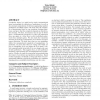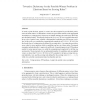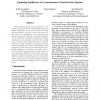13 search results - page 2 / 3 » Strategic voting when aggregating partially ordered preferen... |
ATAL
2008
Springer
13 years 7 months ago
2008
Springer
Complexity theory is a useful tool to study computational issues surrounding the elicitation of preferences, as well as the strategic manipulation of elections aggregating togethe...
ATAL
2005
Springer
13 years 10 months ago
2005
Springer
The aggregation of conflicting preferences is a key issue in multiagent systems. Due to its universality, voting has a central role among preference aggregation mechanisms. Votin...
JCSS
2010
13 years 3 months ago
2010
To make a joint decision, agents (or voters) are often required to provide their preferences as linear orders. To determine a winner, the given linear orders can be aggregated acc...
IDEAS
2006
IEEE
13 years 11 months ago
2006
IEEE
Unlike numerical preferences, preferences on attribute values do not show an inherent total order, but skyline computation has to rely on partial orderings explicitly stated by th...
AAAI
2008
13 years 7 months ago
2008
In group decision making, often the agents need to decide on multiple attributes at the same time, so that there are exponentially many alternatives. In this case, it is unrealist...



